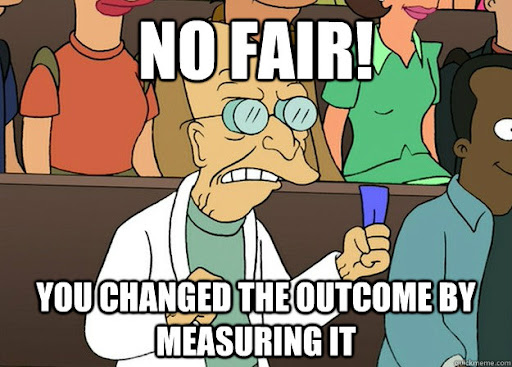AFib patients using wearable devices are more likely to engage in high rates of symptom monitoring and experience anxiety than non-users, a study shows.

Perfect use of this meme
AFib patients using wearable devices are more likely to engage in high rates of symptom monitoring and experience anxiety than non-users
Well no shit—how can non-users engage in high rates of symptom monitoring if they don’t have symptom monitors?
“Symptoms monitoring” refers to the conscious state of paying attention to your symptoms, not using devices to monitor your vitals.
There is no “symptom monitoring” device anyway. A “symptom” is something a patient reports, it’s not generally quantifiable using sensors. There’s no sensor that will measure if your chest hurts or if you feel nauseous, you have to tell your doctor that you are experiencing these things.
But having a constant personal feed of vital stats can make you pay a lot more attention to those symptoms if it turns into an exercise in paying excess attention to your body. Basically, too much information encourages hypochondria.
Elevated heart rate is a symptom, one that is quantifiable and monitorable.
OR, are people that monitor symptoms and stress about it more likely to buy a wearable that allows them to do that?
If anything I have the opposite with my garmin watch that shows my heart rate. I’ve gotten used to seeing what my heart rate does just before I have a panic attack. This has really helped me ‘catch’ myself before it happens and calm myself down. I’ve not had one for over 2 years.
In a similar vain, I tried out a garmin smartwatch for a while, and at some point it warned me I was getting stressed.
I wasn’t though - I was excited about a project that I had been working on coming together. But apparently the watch could only think in negative moods.
For that, and other privacy and usability based reasons, I decided to return it and go back to my non-heart-rating Pebble Time Steel.
Correlation or causation?
People that are more anxious about AFib might be more likely to buy a device to monitor it.
Seems to me that these people are being conscious about their health, and that’s somehow a bad thing.
There’s consciousness, and then there’s anxiety inducing obsessive symptom checking. Which may do more harm than good given these are cardiac patients.
Everything in moderation.
Surely we van look at apps that allow more informed data but without the anxiety. Like, here’s your data, this is less frequent than average. Or, here is your data, its the same as before. Or here is your data, its slightly different again, so we’ve already notifies your doctor, but usually this is nothing to be concerned about. Etc.
Lots of patients with other conditions have yo do similar, like diabetics monitoring sugar levels. Or asthmatics who can induce attacks by getting stressed about attacks.
We could build in some mindfulness exercises which help with anxiety. I’d say overall, its better.
It’s more that these people are addicted to knowing if they are dying or not. Compulsively overchecking to the point of detriment.
“Oh my SPO2 is dangerously low, at 82%?”
*adjusts watch to be a bit tighter*
SPO2 back to 98%
So yeah I do monitor it moreso than without, but understanding the limits of the tech, hasn’t made me more worried. Bought one to record sleep schedule. Works very well for that.
Weird that I actually do have heart rythm problems and a couple of different monitors, but I don’t actually think about it unless I’m symptomatic.
This article is a great example of the post hoc fallacy; it’s more likely that people anxious about their heart condition are purchasing wearable monitors at an elevated rate compared to the rest of the population
I personally sometimes experience a lot of PVCs. I obsess over getting a good reading to be able to show my doctor. It also becomes impossible to tell yourself it’s all in your head. My son is a nurse and I know the point at which PVCs go from uninteresting to concerning. At least I know they are never really urgent.
But my primary anxiety comes from my heart not working the way it’s supposed to and being able to feel irregular heartbeats. I take peace in being able to see for myself that they aren’t frequent enough to be overly concerned. But they are a reminder I’m not going to be around forever, that’s for sure.
I disabled those warnings on my smartwatch because they made me worry and it worked like a vicious circle. The more they say high heart rate or something the more I was unable to calm myself down.
Can see them being useful but yeah not for me.
That makes sense. I don’t have a fitness watch but I guess I could apply this to other areas of my life. Maybe there’s a useful and more general theory to be found.
Sort of like how after you walk off a cliff, you don’t start falling until you look down.









